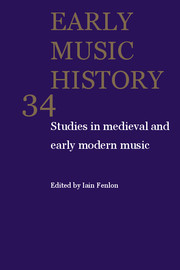Author: Fisher, Alexander
Publication details: Early Music History 34 (2015): 45-95.
Weblink: https://cambridge.org
Abstract: A venerable form of petitionary prayer, the litany emerged as a key aural expression of Counter-Reformation Catholicism around the turn of the seventeenth century, particularly in the confessionally contested borderlands of the Holy Roman Empire. Its explicit projection of the dogma of sanctoral intercession, rejected soundly by Protestant theologians, helped to make the litany a flashpoint for religious controversy. Especially in the duchy of Bavaria, the northern bastion of the Counter-Reformation, the litany flourished in a wide variety of monophonic and polyphonic forms that reflected its fluid position on a spectrum between oral and written traditions. This essay explores the usage and significance of the litany in Counter-Reformation Germany, focusing especially upon the Thesaurus litaniarum (Treasury of Litanies, 1596) by Georg Victorinus, music director of the Munich Jesuits. Intimately connected with currents of Catholic reform in German-speaking lands, this great anthology illustrates the varied and creative ways in which composers responded to the litany’s distinctive ebb and flow of titles and petitions to holy intercessors.
